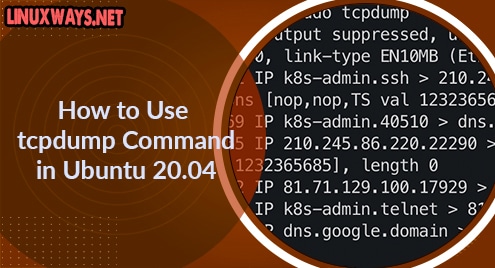

- #How to install tcpdump on linux ubuntu how to#
- #How to install tcpdump on linux ubuntu archive#
- #How to install tcpdump on linux ubuntu code#
$ sudo chown root:snap-daemon $HOME/captures In these cases, you will need to create a directory that snap_daemon can write to. $ sudo snap connect tcpdump:removable-media If want to save pcap files to $HOME or /media, optionally: $ sudo snap connect tcpdump:home Ubuntu Main amd64 Official: tcpdump4.9.b: command-line network traffic analyzer: Ubuntu Main arm64 Official: tcpdump4.9.b: command-line network traffic analyzer: Ubuntu Updates Main amd64 Official: tcpdump4.9.3-0ubuntu0.18.04.

If you prefer, you may use '-Z root' to prevent dropping privileges and then write out anywhere in the snap's writable areas. Eg: $ sudo tcpdump -w /var/snap/tcpdump/common/captures/my.pcap To write out captures, the /var/snap/tcpdump/common/captures directory is created with snap_daemon ownership. Just in case it’s not already installed, you can use the appropriate command below to install it through your system’s package manager. Tcpdump will drop privileges to the snap_daemon user and group by default. Install tcpdump on major Linux distros There’s a good chance that your Linux distro already has tcpdump installed by default, especially if you’re running a distro geared towards servers.
#How to install tcpdump on linux ubuntu archive#
The deb of tcpdump from the Ubuntu archive as a snap. This snap is not maintained by and instead packages You can use this tool to trackĭown network problems, to detect attacks or to monitor network activities. It can be used to print out the headers of packets on a network interface,įilter packets that match a certain expression.
#How to install tcpdump on linux ubuntu how to#
IGMP, SMB, OSPF, NFS and many other packet types. In this article i will show you how to install tcpdump tool and tech how to usage tcpdump.
#How to install tcpdump on linux ubuntu code#
tcpdump is able toĮxamine IPv4, ICMPv4, IPv6, ICMPv6, UDP, TCP, SNMP, AFS BGP, RIP, PIM, DVMRP, That's because 1) libpcap-dev (probably) depends on the libpcap package, and will bring it in and 2) if you have source code that needs libpcap, you not only will need the libpcap package (whatever it's called - its name might be 'libpcap0.8', for various Debian reasons), which provides shared libraries for already-built programs that use libpcap, but you will also need the libpcap-dev package. To capture only the packets of a specific protocol type, you need to specify the protocol (for example, IP, IP6, ARP, TCP or UDP).This program allows you to dump the traffic on a network. To capture all packets arriving at or departing from the host with the IP address of 192.168.198.2, we can use the following command: To display packets in ASCII (useful for capturing web pages), use the -A option: In this tutorial we will discuss how to capture and. So to stop or cancel the tcpdump command, type ctrl+c. When we run the tcpdump command without any options then it will capture packets of all the interfaces.

Once it’s run, tcpdump begins printing lines, one for each packet it intercepts. You can specify a particular ethernet interface using the -i option:

Used without any options, tcpdump will capture all the packets flowing through all the interfaces on the system: This tool is used for advanced network troubleshooting and enables you to examine network data in the raw form. Tcpdump is a packet analyzer in Linux that allows you to intercept network packets and log them or display them on the screen.


 0 kommentar(er)
0 kommentar(er)
